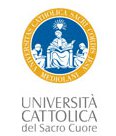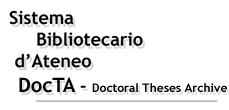|
|
DocTA - Doctoral Theses Archive >
Tesi di dottorato >
CORSO DI DOTTORATO IN STORIA E LETTERATURA DELL'ETA' MODERNA E CONTEMPORANEA >
Citazione:
Utilizza queste indicazioni per citare o creare un link a questo documento.
|
Maffi, Luciano. "Territorio e vitivinicoltura nell'Oltrepò Pavese: dall'indagine geostorica alle sfide attuali della geoeconomia", Università Cattolica del Sacro Cuore, XXI ciclo, a.a. 2007/08, Milano, [http://hdl.handle.net/10280/383].
|
| Titolo: | Territorio e vitivinicoltura nell'Oltrepò Pavese: dall'indagine geostorica alle sfide attuali della geoeconomia |
| Autore/i: | MAFFI, LUCIANO |
| Tutor: | SCHIAVI, ALESSANDRO |
| Coordinatore: | ZARDIN, DANILO |
| Lingua: | ITA |
| Abstract in italiano della tesi: | La ricerca analizza l’evoluzione della vitivinicoltura nell’Oltrepò Pavese quale elemento caratterizzante il paesaggio di questo territorio. Tale settore produttivo risulta essere una delle principali attività svolte nell’area in esame e ne caratterizza l’economia, il paesaggio collinare, le tradizioni e le forme identitarie, specialmente nellla zona centro-orientale, ossia nei territori che gravitano sui centri urbani di Casteggio, Broni e Stradella.
Il lavoro si propone di approfondire anzitutto la valorizzazione della tipicità e del locale, riassunti e rappresentati nel termine terroir, che indica l’insieme degli elementi geomorfologici, climatici, antropici e culturali che rendono unico un prodotto (in questo caso il vino), mettendo così il locale al centro di un’analisi che si può estendere poi a riflessioni di ordine generale.
L’indagine geografica ha studiato gli aspetti ambientali e quelli antropici, nonché le loro relazioni. Si è fatto riferimento ai fattori geologici, pedologici e climatici, che altresì sono gli elementi imprescindibili degli studi di «zonazione» che si occupano proprio dell’interazione tra viticoltura e ambiente.
L’indagine geostorica-territoriale si è rivolta soprattutto ai seguenti temi: il paesaggio vitivinicolo; i tipi di vitigni impiantati e i relativi sistemi di coltivazione; le produzioni e la commercializzazione del prodotto; la rappresentazione delle proprietà e del territorio attraverso i catasti.
Inoltre si approfondiscono i temi geoeconomici sia a scala globale sia a scala locale, grazie alla rielaborazione delle informazioni relative al settore produttivo. Il contesto locale pertanto è confrontato con quello regionale, nazionale e globale, al fine di comprenderne i legami, soprattutto in relazione alle attuali sfide geoeconomiche. |
| Abstract in inglese: | In this thesis we analyse the evolution of grape growing and wine making as two of the elements which have contributed to the shaping of the landscape in the Oltrepò Pavese and represent two of the main economic activities of this geographic area, with is often identified with them – particularly in the mid-western part, i.e., the areas around the towns of Casteggio, Broni and Stradella.
My main goal is to investigate the ways in which the values of locality and typicity – represented by the term terroir – are promoted. “Terroir” stands for, and comprises, a number of elements such as geo-morphological and climatic features, as well as human and cultural factors, all of which contribute to the uniqueness of a product like wine. My research thus starts from, and gives prominence to, the local level, in order to formulate a set of observations from which more general conclusions may then be drawn.
The geographical investigation focusses on the environmental and human factors as well as their interrelationships. In its course, we refer to factors such as geology, pedology and climate, the crucial elements of all studies of «zoning», which describe precisely the complex interaction between grape growing and the environment.
The geo-historical analysis concentrates especially on thematic areas such as the landscape; the varieties of grape that are planted and the respective growing techniques; the production and marketing of the produce; the ways in which property boundaries and the territory have been represented in land registries.
The geo-economic factors, at both the local and global levels, are investigated through the analysis of the data from the production sector. The local context is thus compared to the regional, national and global ones in order to better understand the nature of their interactions and provide useful insights in relation to the challenges posed by the current geo-economic scenarios. |
| Data di discussione: | 17-feb-2009 |
| URI: | http://hdl.handle.net/10280/383 |
| È visualizzato nelle collezioni: | CORSO DI DOTTORATO IN STORIA E LETTERATURA DELL'ETA' MODERNA E CONTEMPORANEA
FACOLTA' DI SCIENZE DELLA FORMAZIONE
|
File in questo documento:
| File |
Dimensioni | Formato | Accessibilità |
|---|
| testo_completo.pdf | 7,21 MB | Adobe PDF | non consultabile
|
| 01frontespizio.pdf | 370,73 kB | Adobe PDF | non consultabile
|
|
Accesso e utilizzo dei contenuti di DocTA
|



